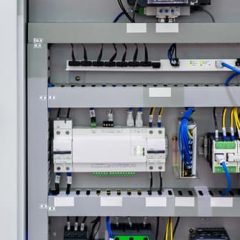How Smart Manufacturing Can Benefit from IoT in Industry 4.0
Solutions > Smart Manufacturing > How Smart Manufacturing Can Benefit from IoT in Industry 4.0

Industry 4.0 and the Internet of Things (IoT)
Industry 4.0 and the Internet of Things (IoT) have become essential in the tech landscape in recent years. Industry 4.0 refers to the fourth industrial revolution, characterized by automation and data exchange. Key technological features include Industrial Internet of Things (IIoT), cloud computing, and AI. To unleash the full potential of Industry 4.0, easy access to data and analytical capabilities are crucial, emphasizing the significance of “interconnectivity.” Information flow, from collection and integration to application and analysis, is pivotal.
IoT, on the other hand, encompasses various technological solutions to meet the demand for interconnectivity. IoT involves connecting physical objects to the internet, generating, exchanging, and processing data through sensors and software. Leveraging next-gen wireless and mobile technologies, such as traditional mobile networks or low-power wide-area networks, IoT extends applications to remote monitoring, predictive maintenance, facility management, and manufacturing efficiency. It effectively streamlines operations and mechanical processes, expands new production lines, and enhances production line quality.



Application of smart factories and the Internet of Things (IoT) in Industry 4.0
When it comes to the application of smart factories and the Internet of Things (IoT) in Industry 4.0, we can observe several key areas benefiting. Firstly, the scope of IoT applications includes monitoring and diagnostics, remote monitoring and control, asset tracking, production data analysis, energy efficiency optimization, safety monitoring, and more, all contributing to improving manufacturing efficiency and intelligence.
In the realm of monitoring and diagnostics, real-time monitoring of devices and early fault warnings can reduce the risk of downtime. Remote monitoring and control enable the remote management of factory equipment, facilitating remote operations and adjustments to enhance production efficiency. Asset tracking, through sensors and connected devices, tracks the location, status, and usage of assets, optimizing material management and reducing costs.
Concerning production data analysis, the collection, analysis, and application of production data provide insights to optimize manufacturing processes for improved efficiency and quality. Simultaneously, energy efficiency optimization enhances energy efficiency by monitoring energy usage and implementing intelligent adjustments. Safety monitoring utilizes sensors and monitoring systems to strengthen safety control in factories and equipment, preventing accidents.
In terms of production line optimization, IoT technology collects data on production lines, including output, energy usage, and efficiency, to help optimize production scheduling, reduce waste, and increase productivity. In quality control, IoT devices monitor the product manufacturing process, enabling real-time defect detection and prevention, thereby enhancing product quality and reducing defect rates.
Supply chain transparency, through IoT sensors and connected devices, achieves real-time monitoring, allowing traceability and management from raw material procurement to the delivery of finished products, thus improving supply chain efficiency. In intelligent warehouse management, IoT technology is utilized to optimize warehouse and logistics management, including cargo tracking, inventory management, and automated order processing.
Overall, the implementation of IoT solutions can make the manufacturing process more intelligent, flexible, and efficient. These technologies, combining sensors, connected devices, data analytics, and cloud platforms, provide comprehensive data and insights, assisting manufacturing enterprises in making better decisions. However, achieving these applications typically requires establishing a robust IoT infrastructure while ensuring relevant security measures to protect factory systems from potential security risks.
IoT Gateway
Implementing the applications of the aforementioned Internet of Things (IoT):
The Internet of Things (IoT) gateway plays a crucial role in the manufacturing industry, facilitating smart manufacturing, monitoring, and management. Its fundamental functionalities include acting as a connectivity bridge, protocol conversion facilitator, ensuring security, data integration, remote management, real-time responsiveness, and scalability. Modern IoT gateways exhibit advanced features:
1. Communication Protocol Support: IoT gateways support various communication protocols such as MQTT, CoAP, HTTP, ensuring seamless communication with diverse devices.
2. Edge Computing: Advanced IoT gateways possess edge computing capabilities, enabling local data processing on devices, enhancing real-time performance, and reducing reliance on central servers.
3. Remote Configuration and Updates: They allow remote configuration and software updates, enhancing system management flexibility while reducing the time and cost associated with physical access.
4. Security Mechanisms: Robust security measures, including data encryption, access control, and firewalls, ensure data security during transmission and storage.
5. Multi-Protocol Conversion: The ability to convert different communication protocols and IoT standards ensures interoperability among various devices.
6. Cloud Integration: Seamless integration with different cloud platforms, such as AWS, Azure, Google Cloud, enables centralized data management and analysis.
7. Real-time Monitoring: Provision of real-time device monitoring and troubleshooting functions facilitates swift response to issues, reducing the risk of system downtime.
8.Industry Standard Compliance: Adherence to relevant industry standards and certifications ensures product quality and compatibility.
These advanced features endow IoT gateways with greater communication, computing, information processing, and reporting capabilities, making them indispensable components for implementing IoT applications. Simultaneously, they provide more choices and configuration flexibility in diverse scenarios.

When establishing a smart factory, the practical applications of IoT gateways span various aspects. This includes real-time monitoring and diagnosis of manufacturing devices, utilizing IoT gateways to connect sensors and devices for collecting real-time production data, and employing gateways to track the location, operational status, and usage of manufacturing equipment for asset management. These applications not only effectively prevent machine downtime, improving production efficiency but also aid in optimizing asset allocation, achieving predictive maintenance, and, consequently, cost savings.
Furthermore, by connecting various links in the supply chain, IoT gateways can provide real-time visualization of supply chain data, supporting production planning and inventory management. Overall, IoT IoT gateways not only make manufacturing more flexible and efficient in smart manufacturing but also, by providing more data for analysis and real-time decision-making, contribute to elevating the intelligence of the entire manufacturing process.
In subsequent articles, we will step by step introduce technologies and the IoT Gateway product. Our next topic will be: how to collect data from shopfloor OT (operation technologies) side.

展嘉科技股份有限公司
Your Best Design Partner !



